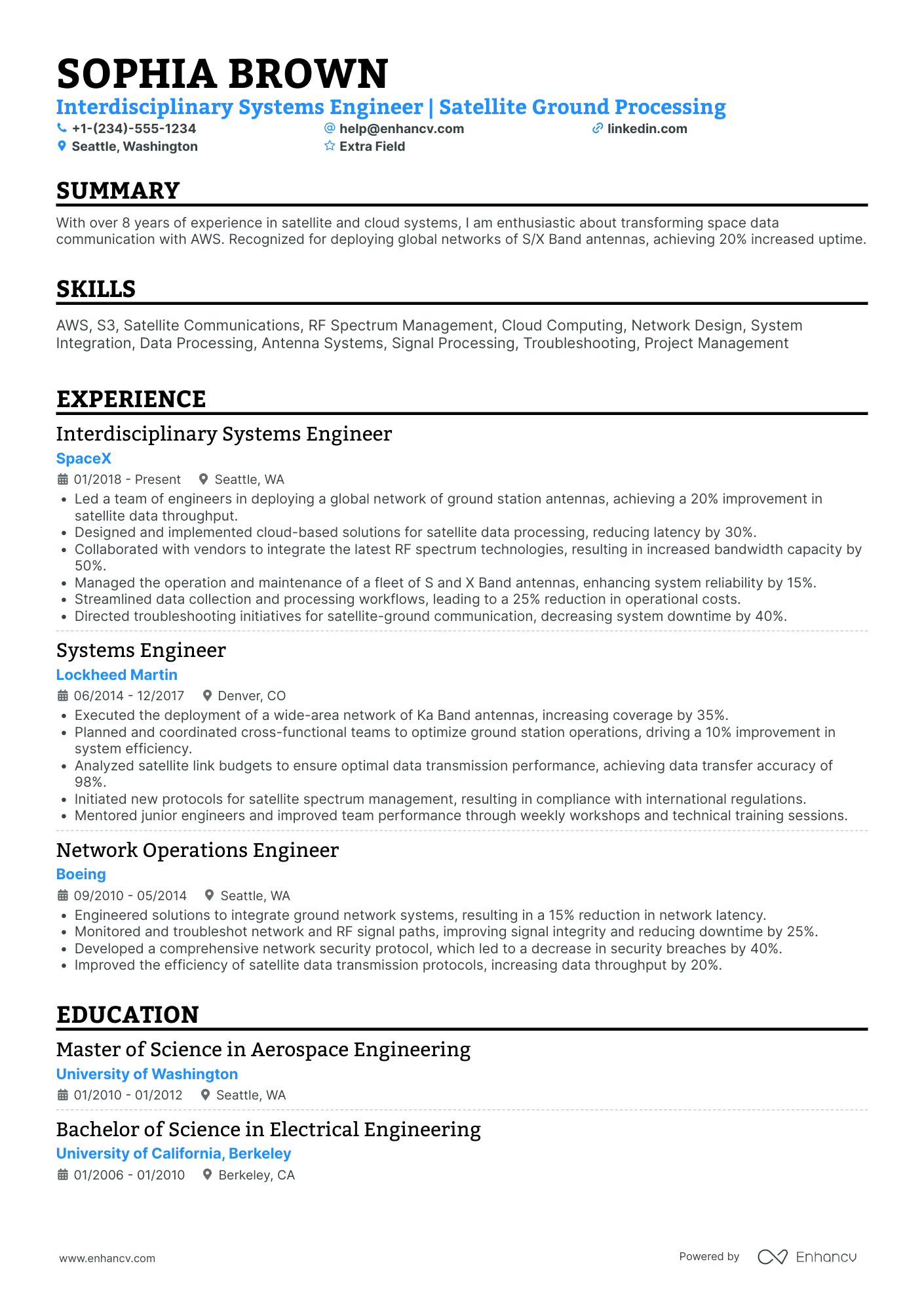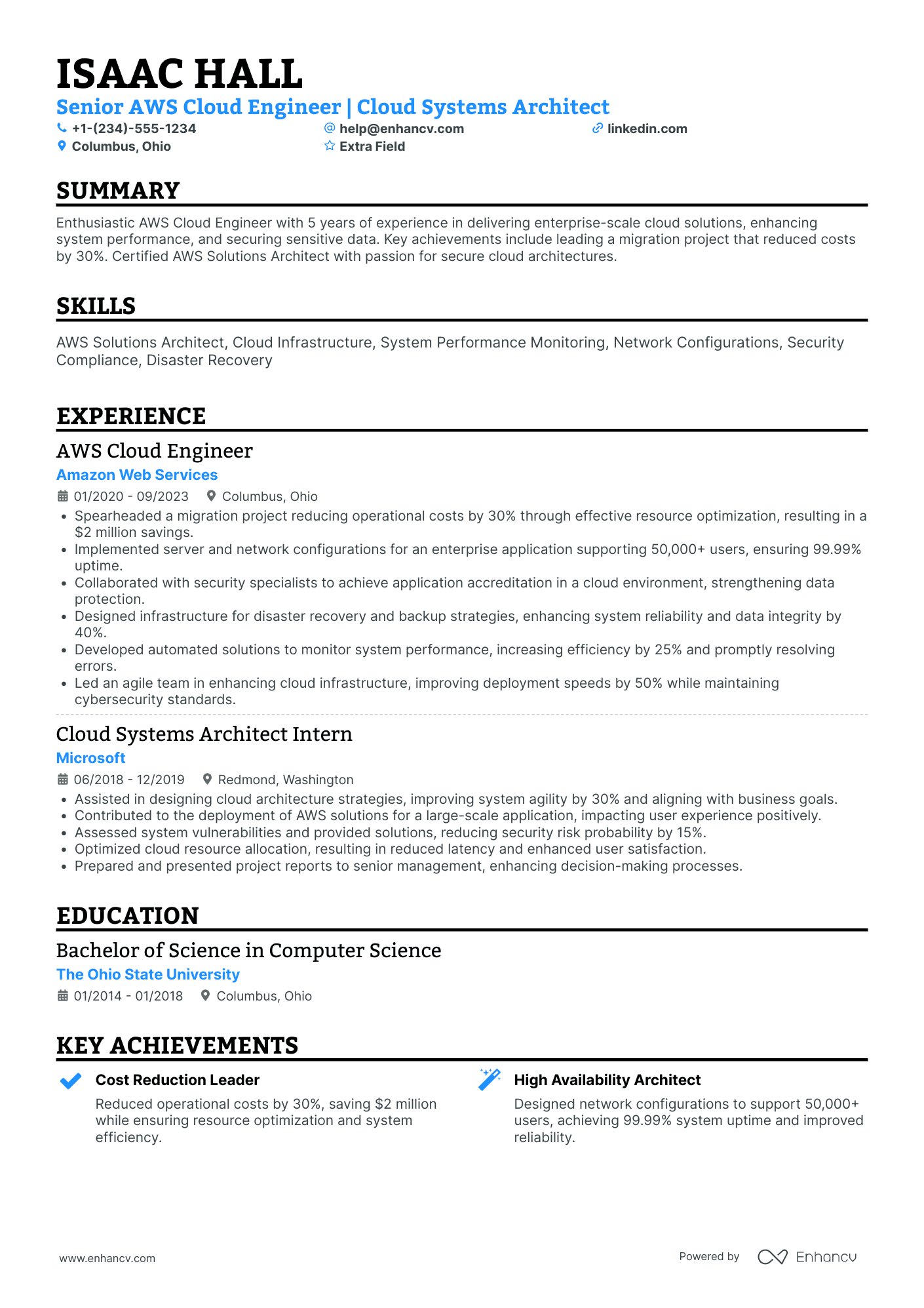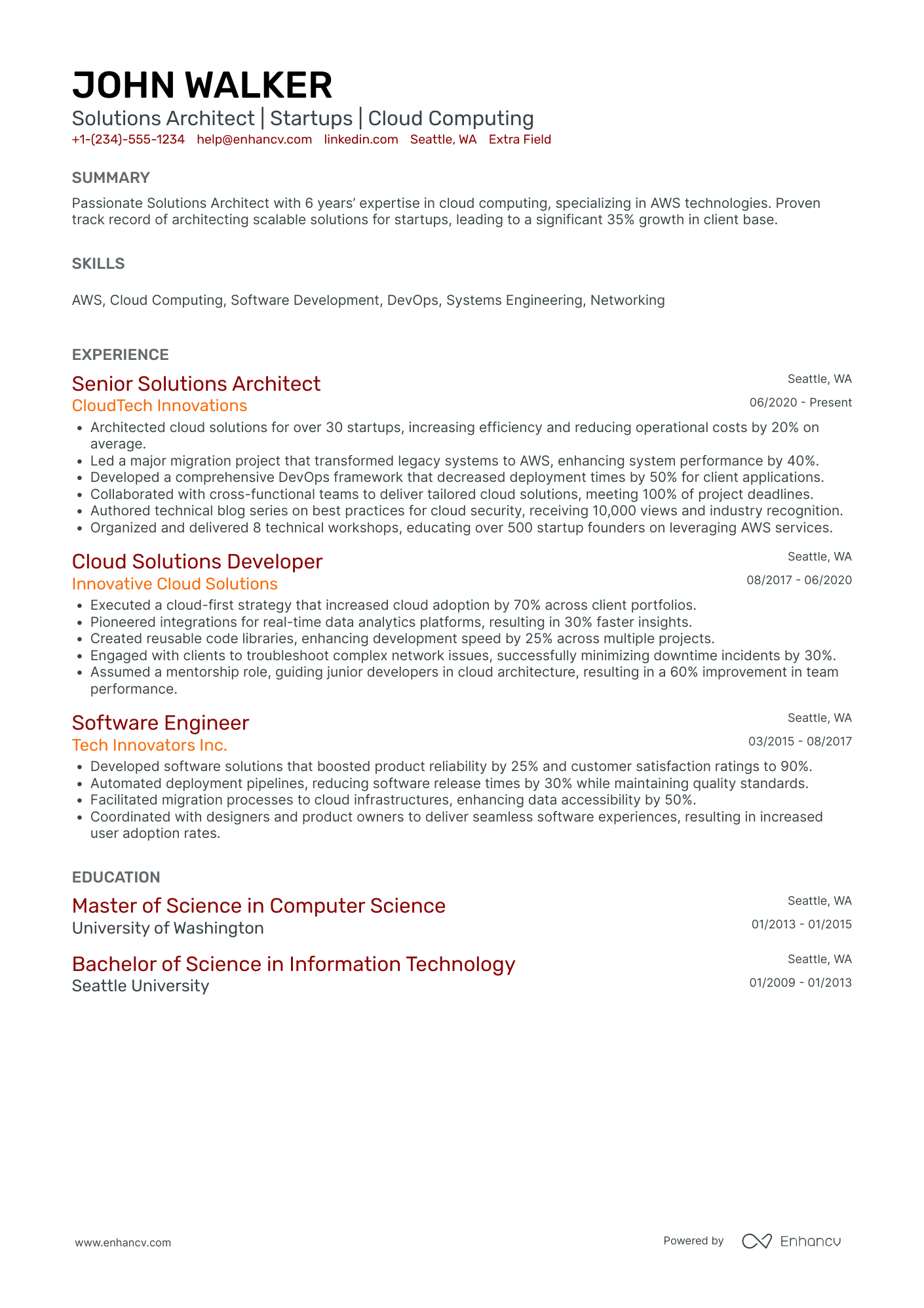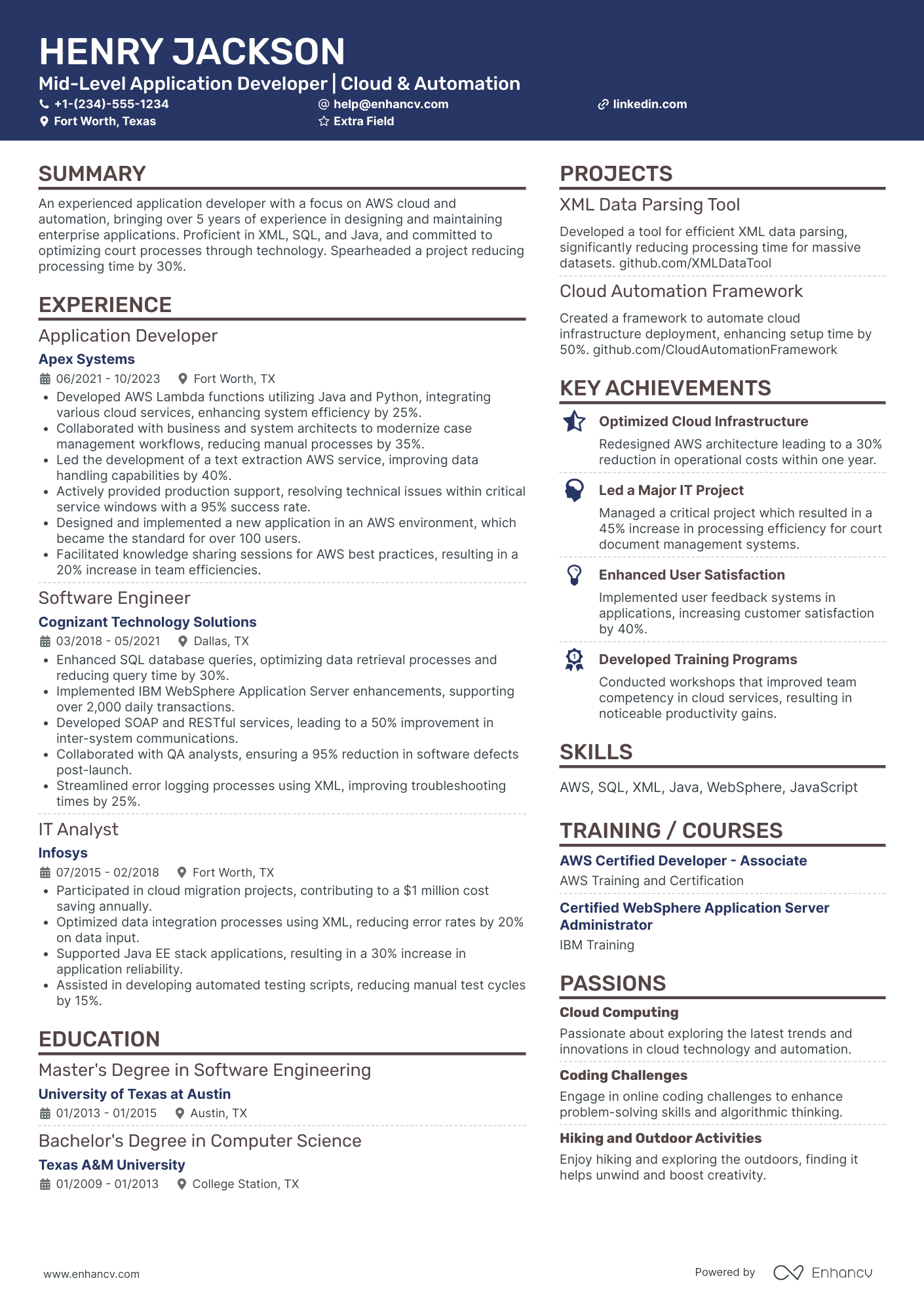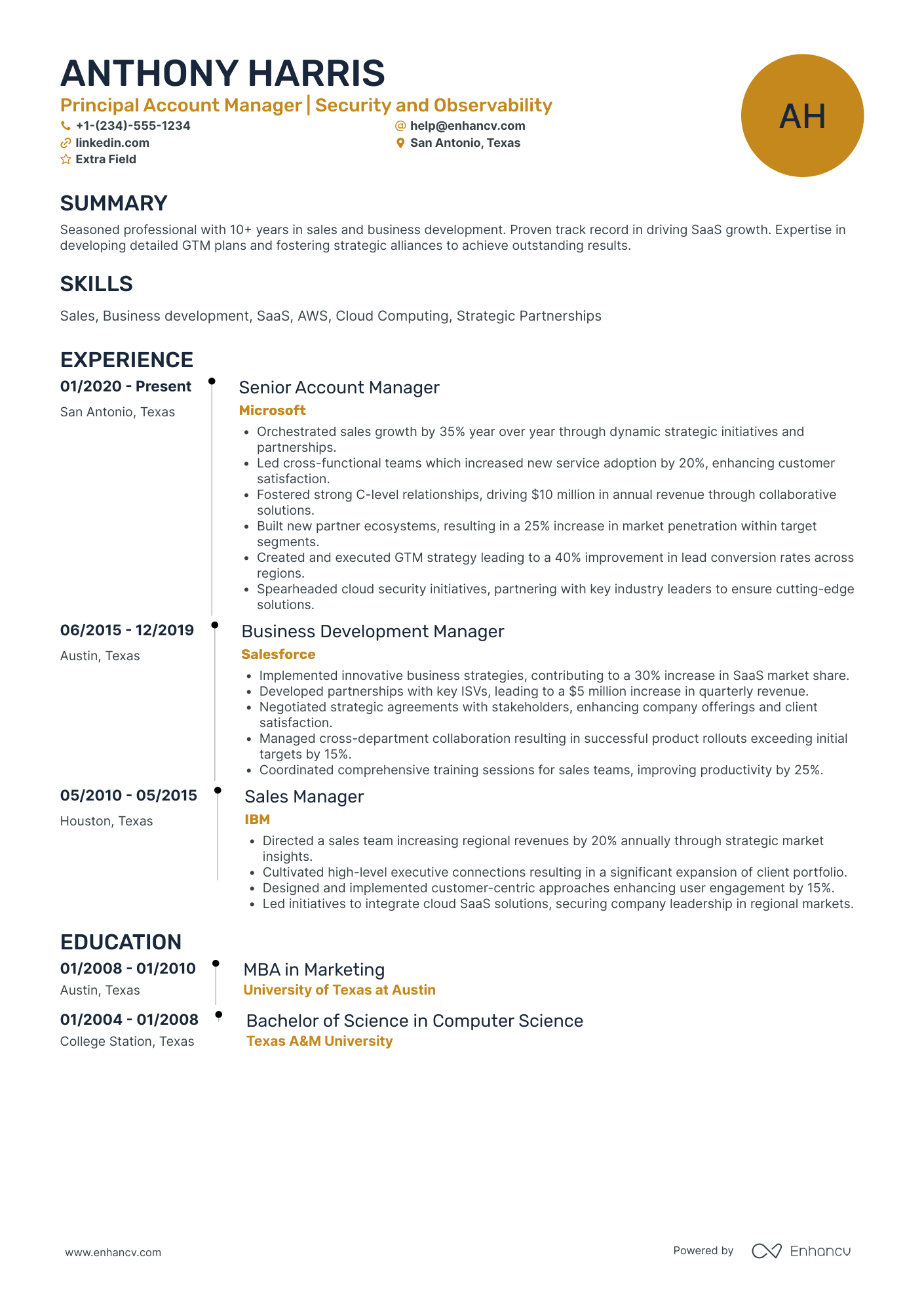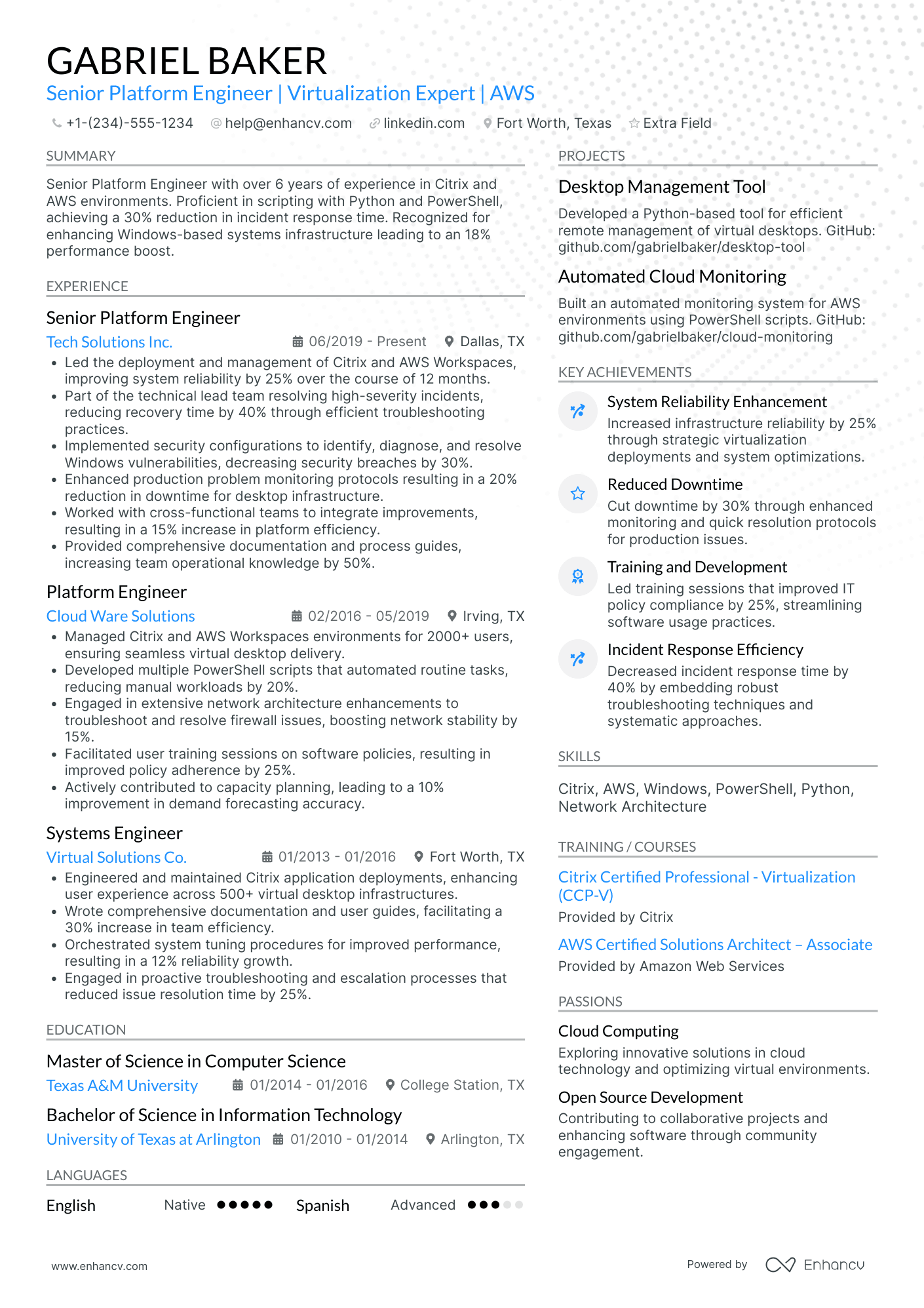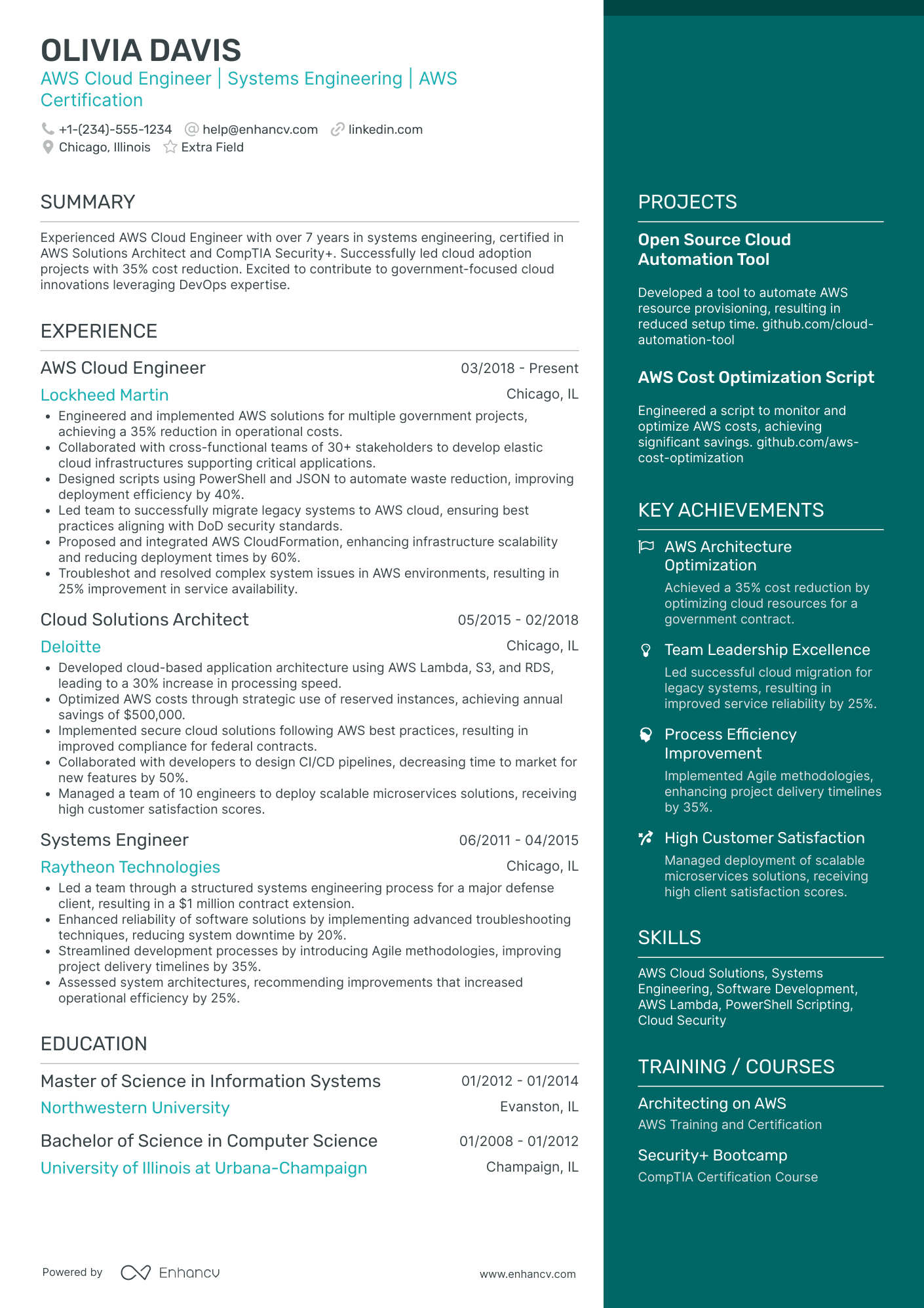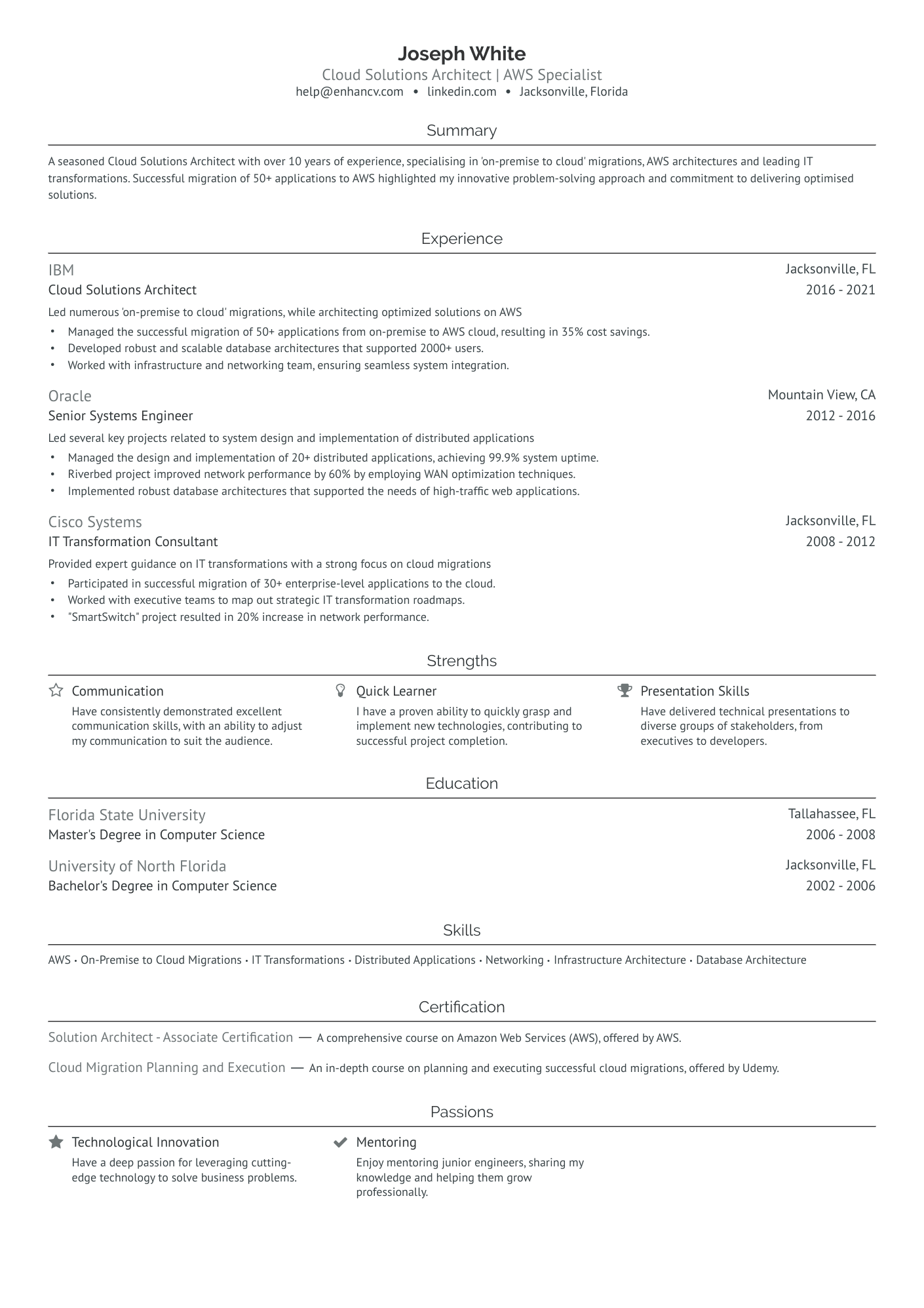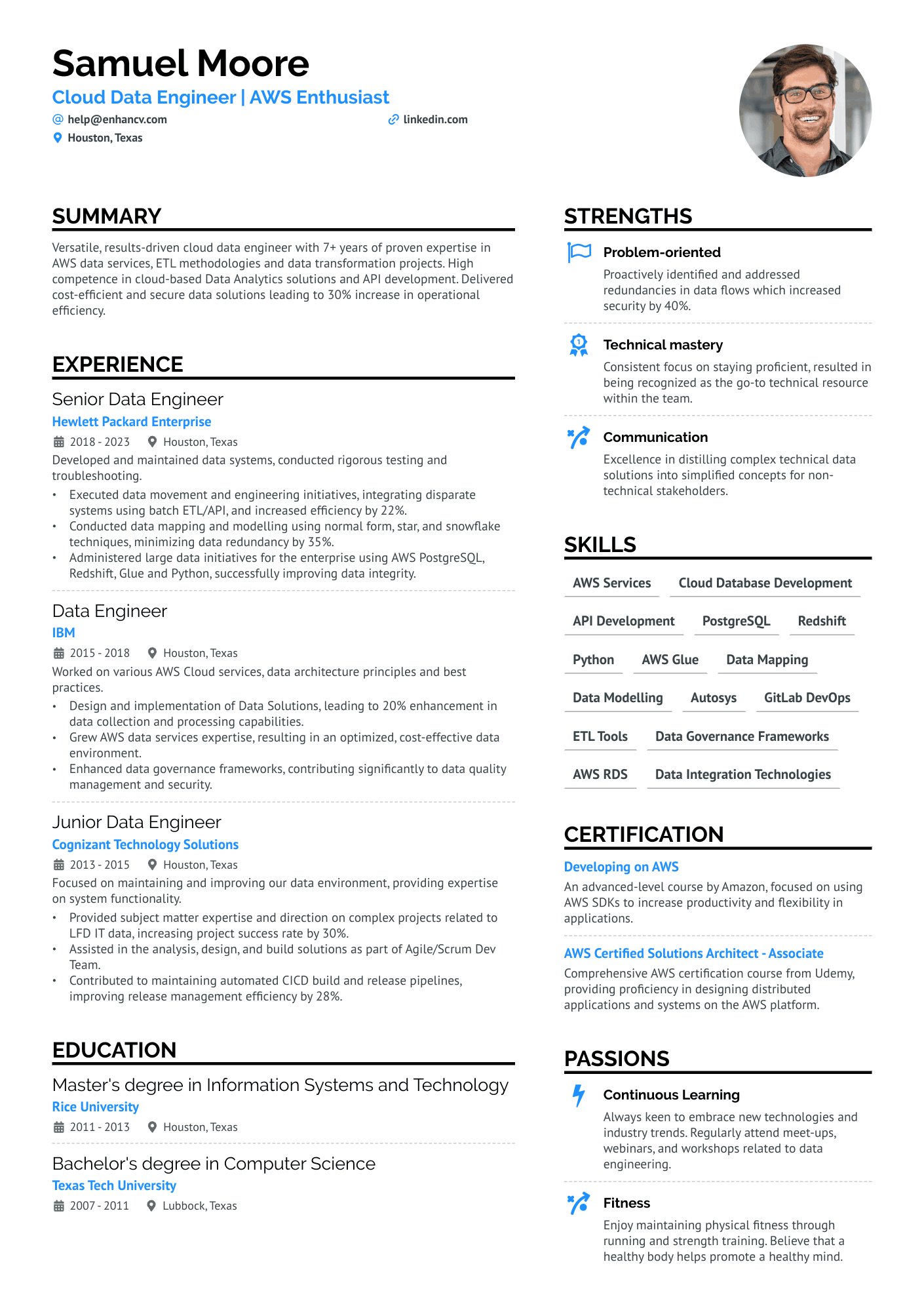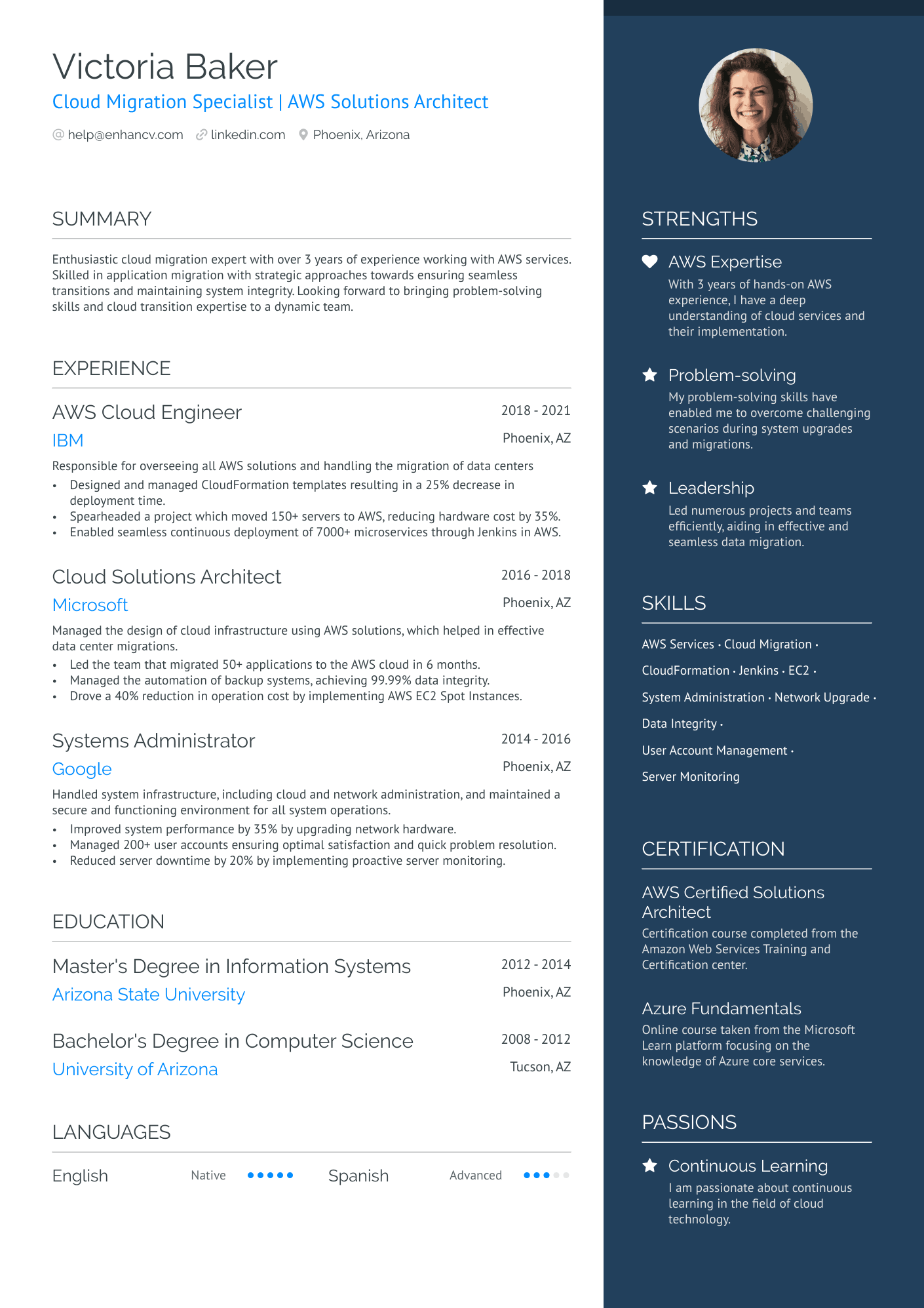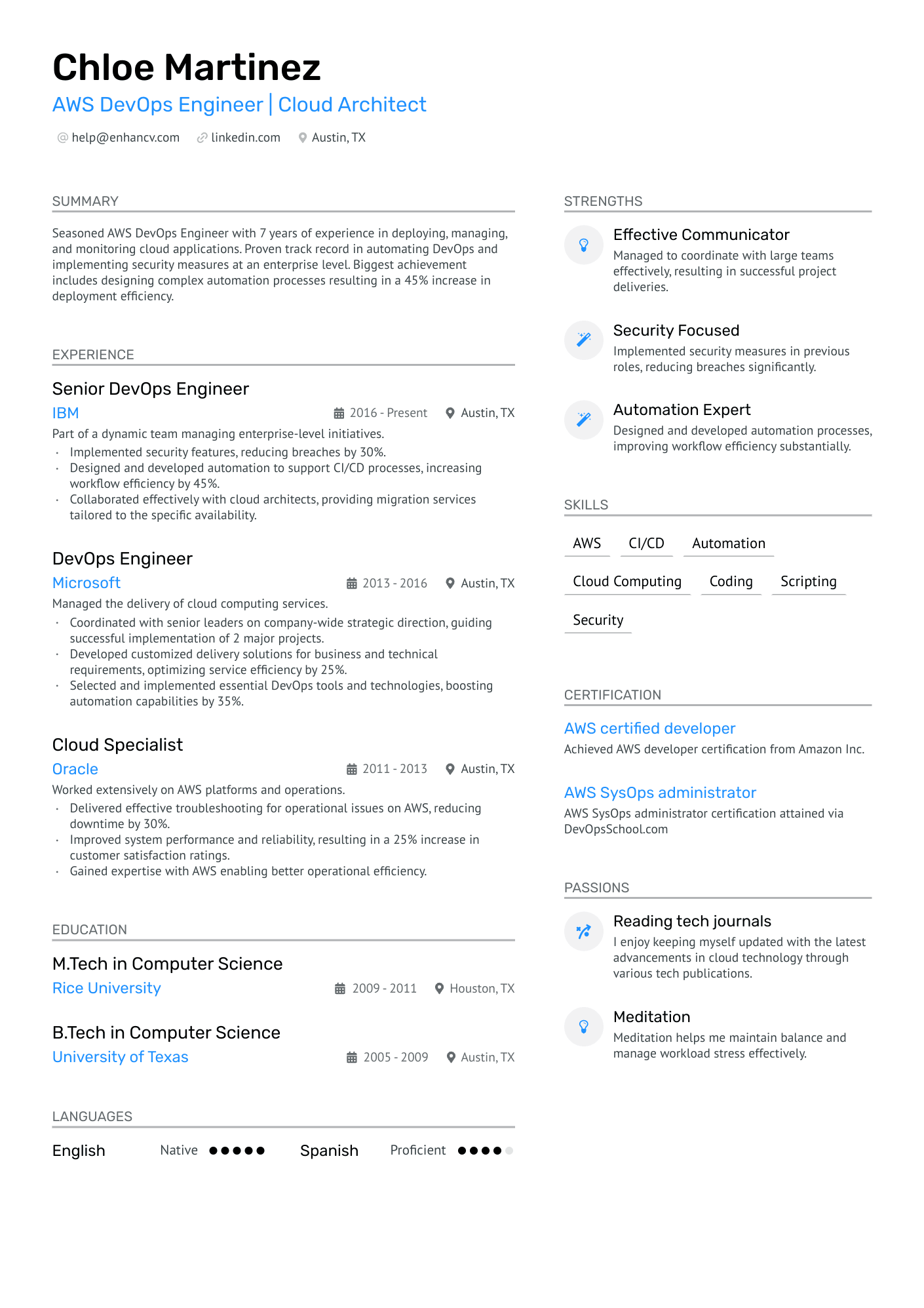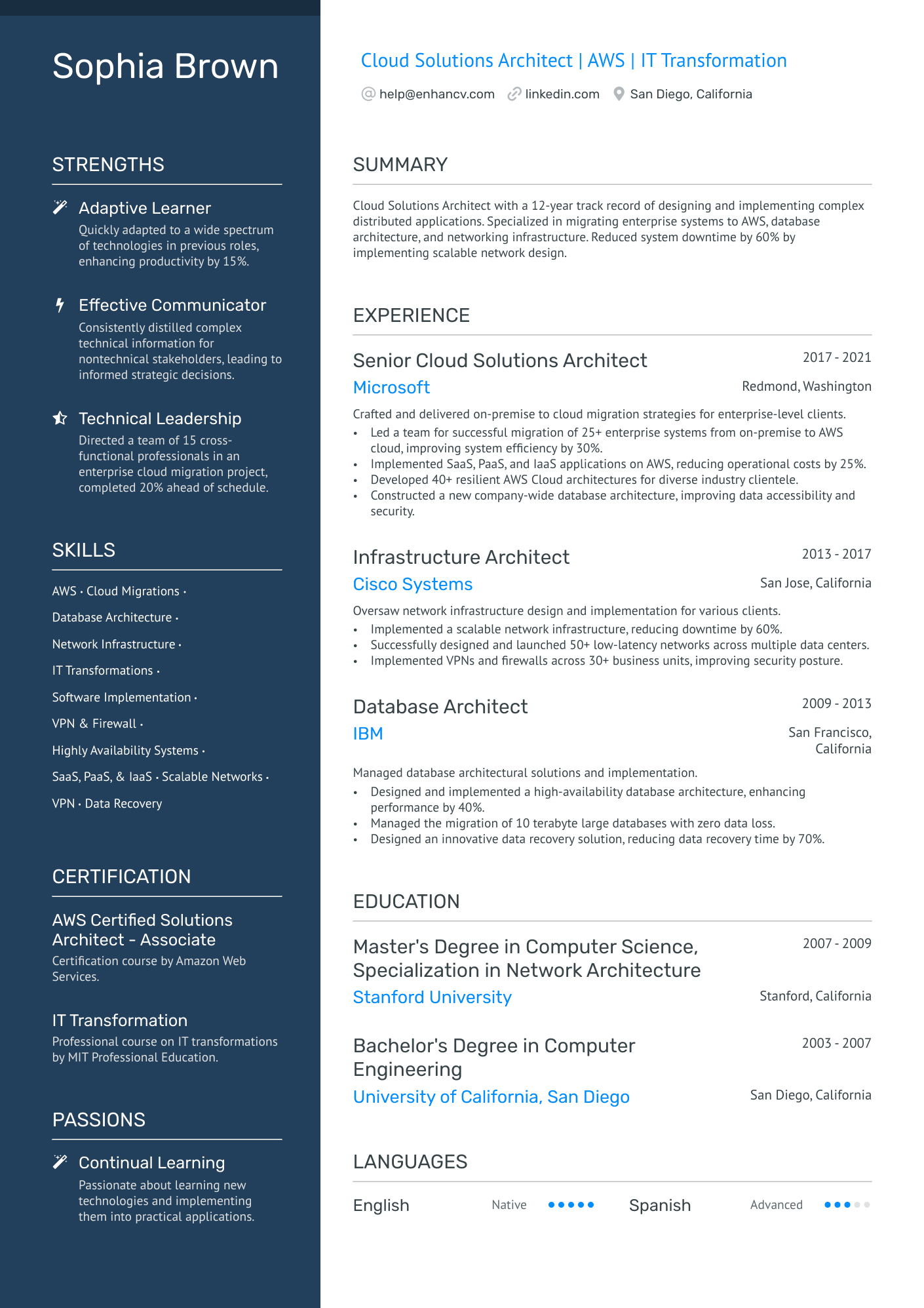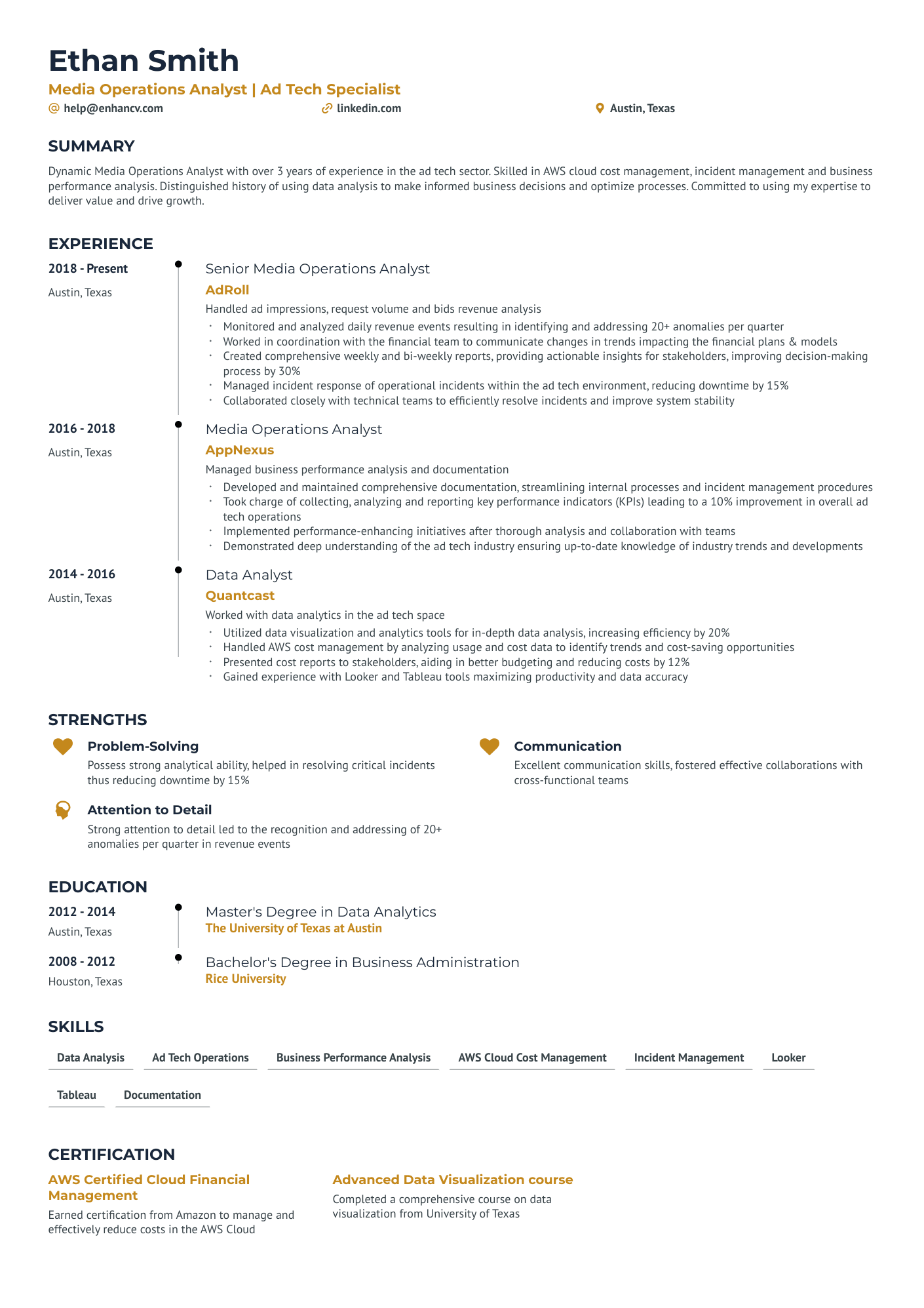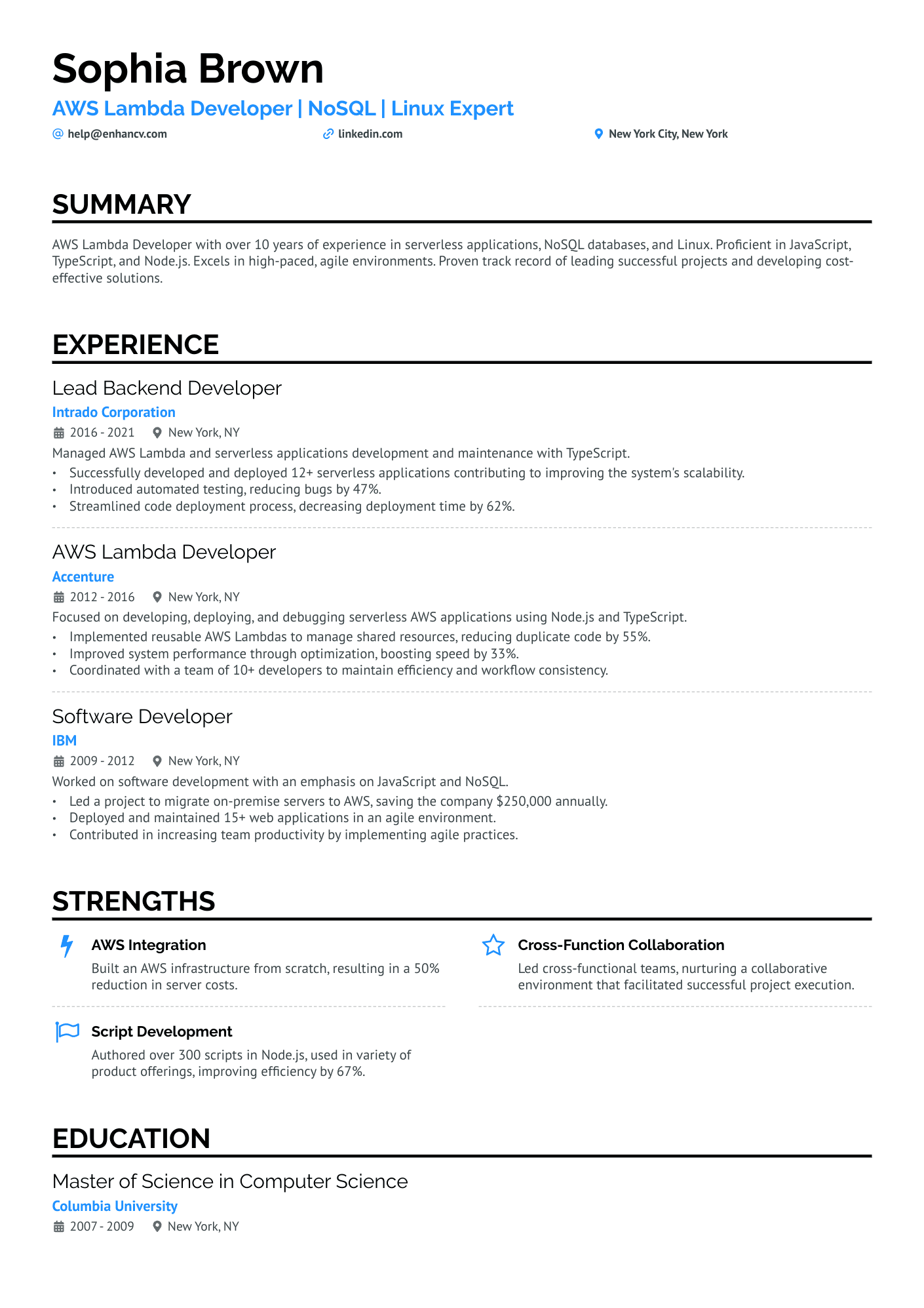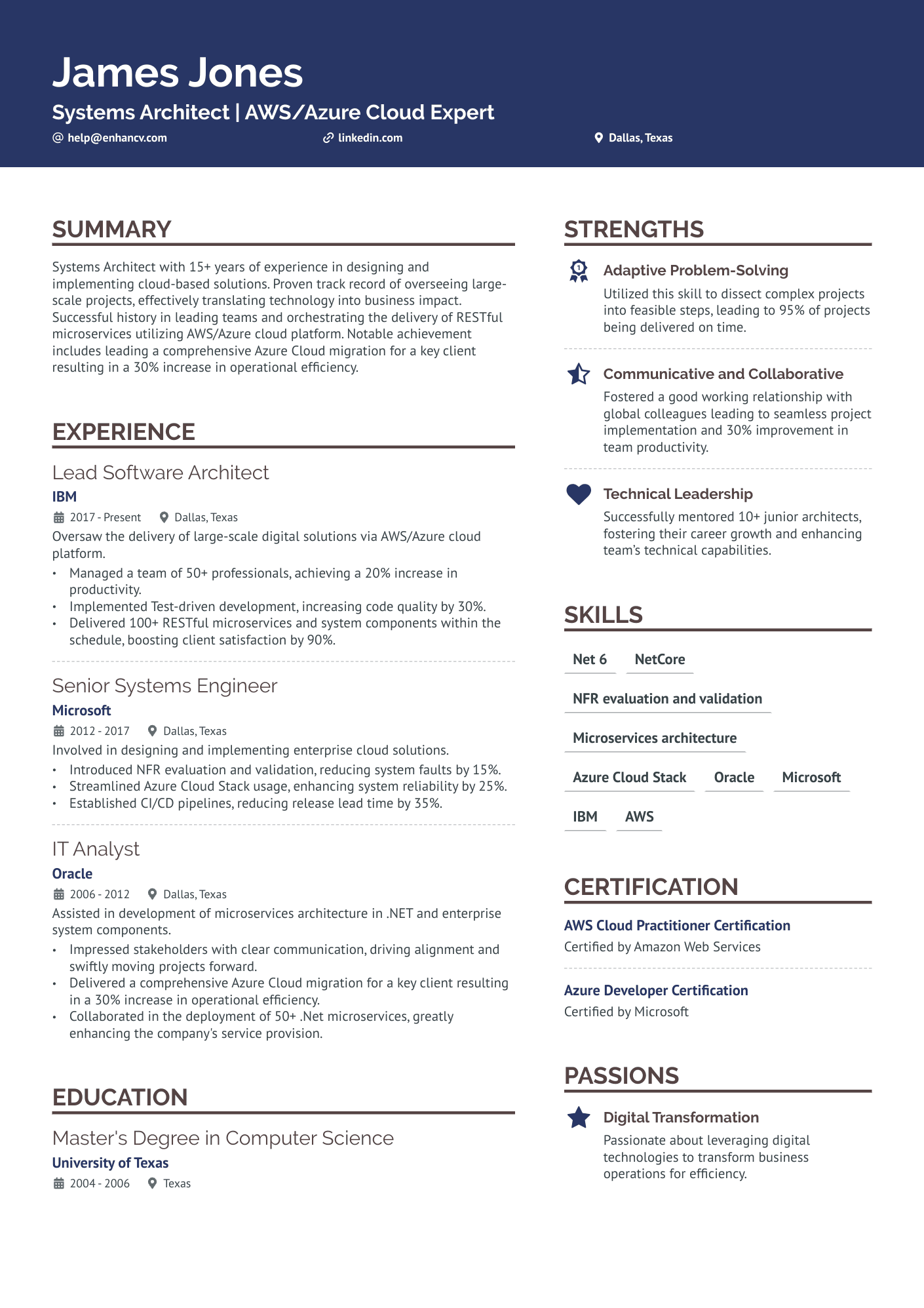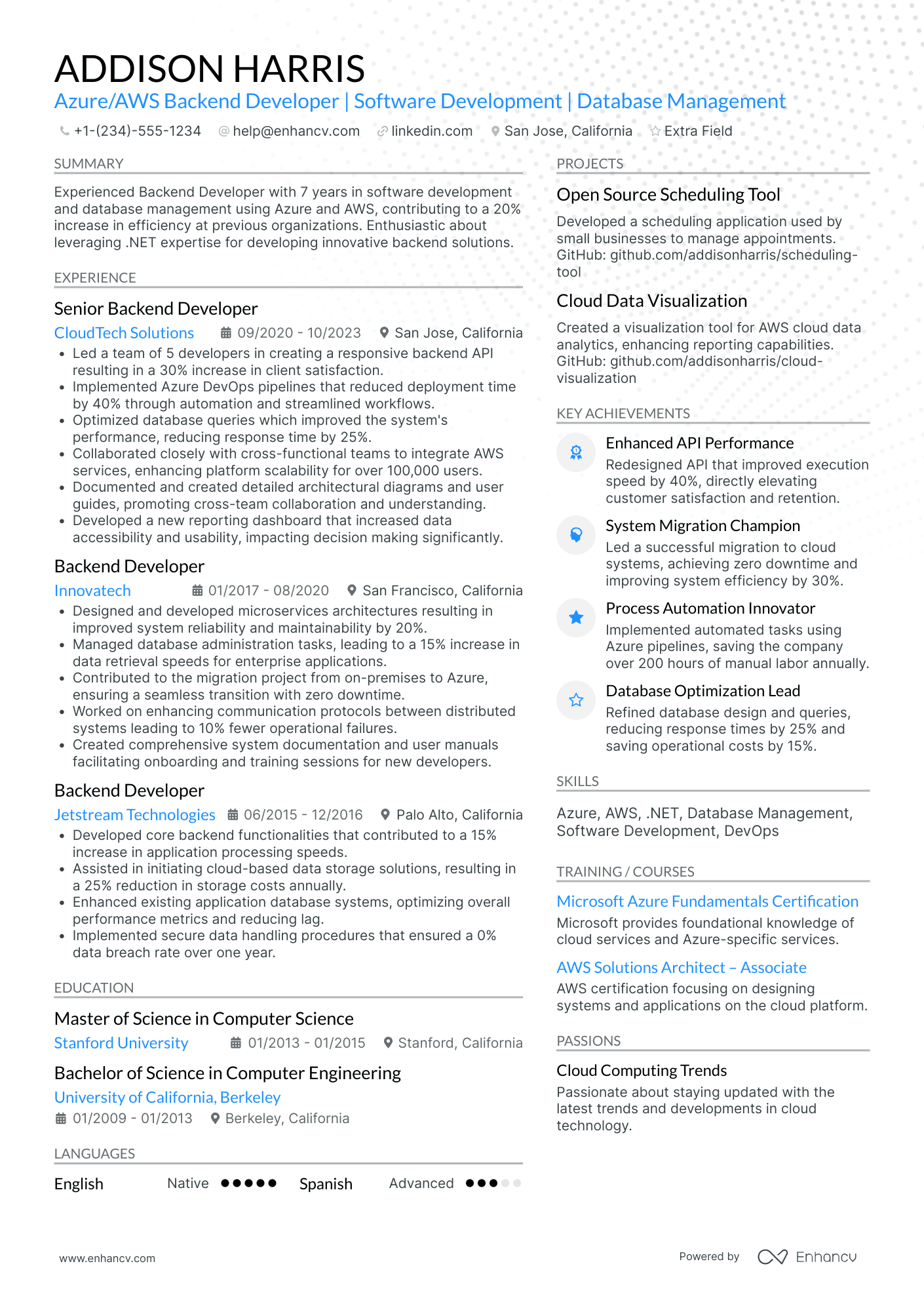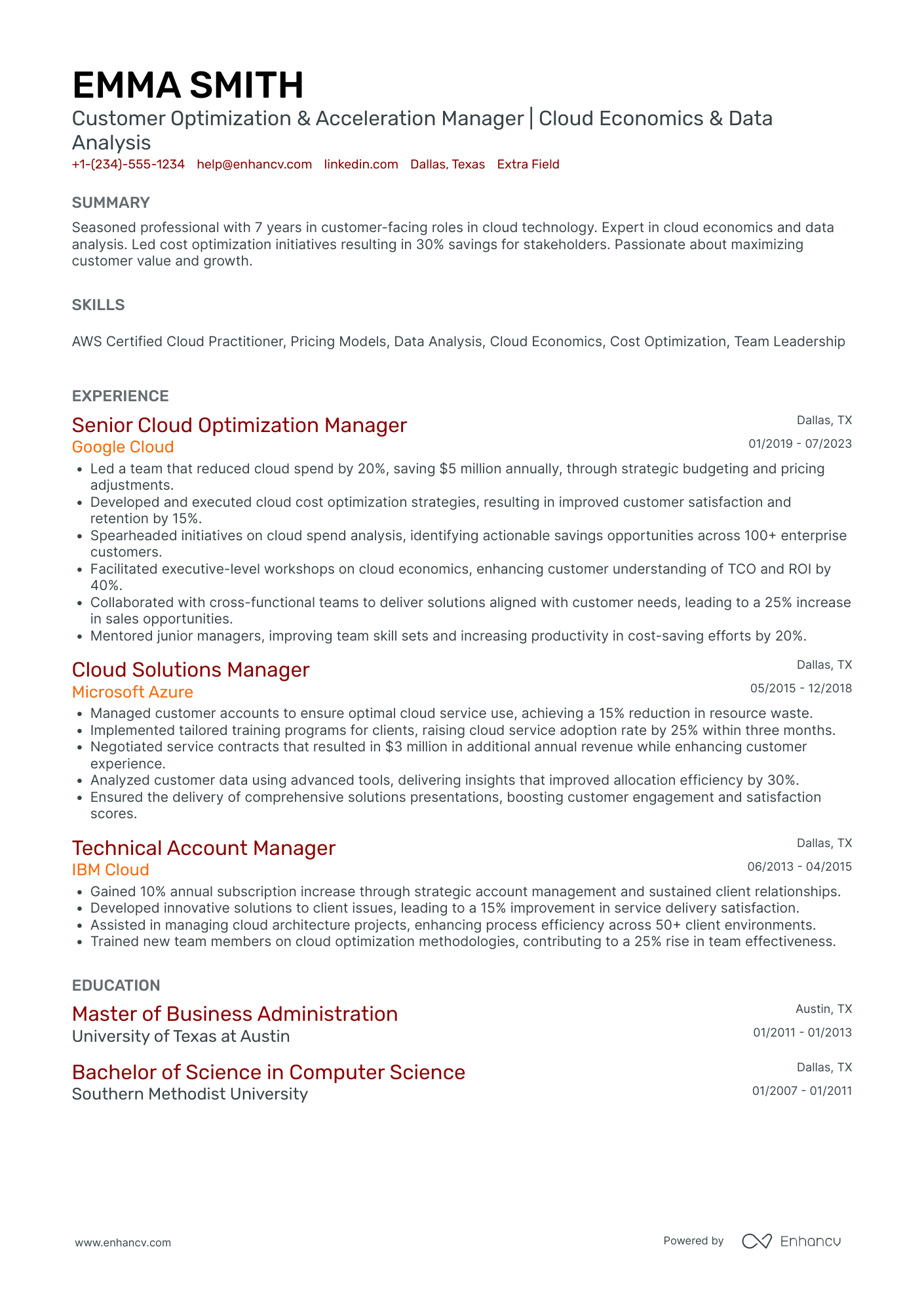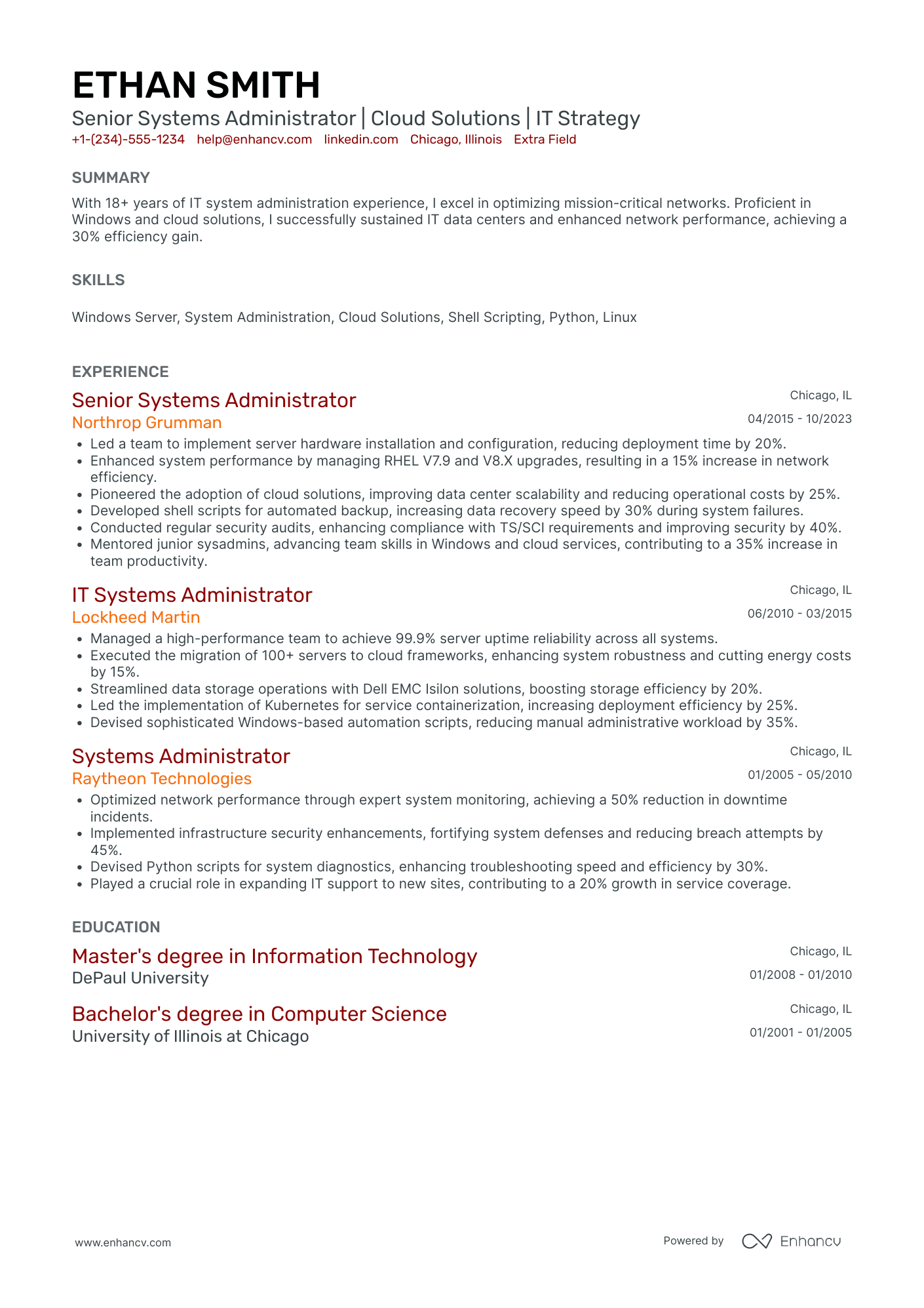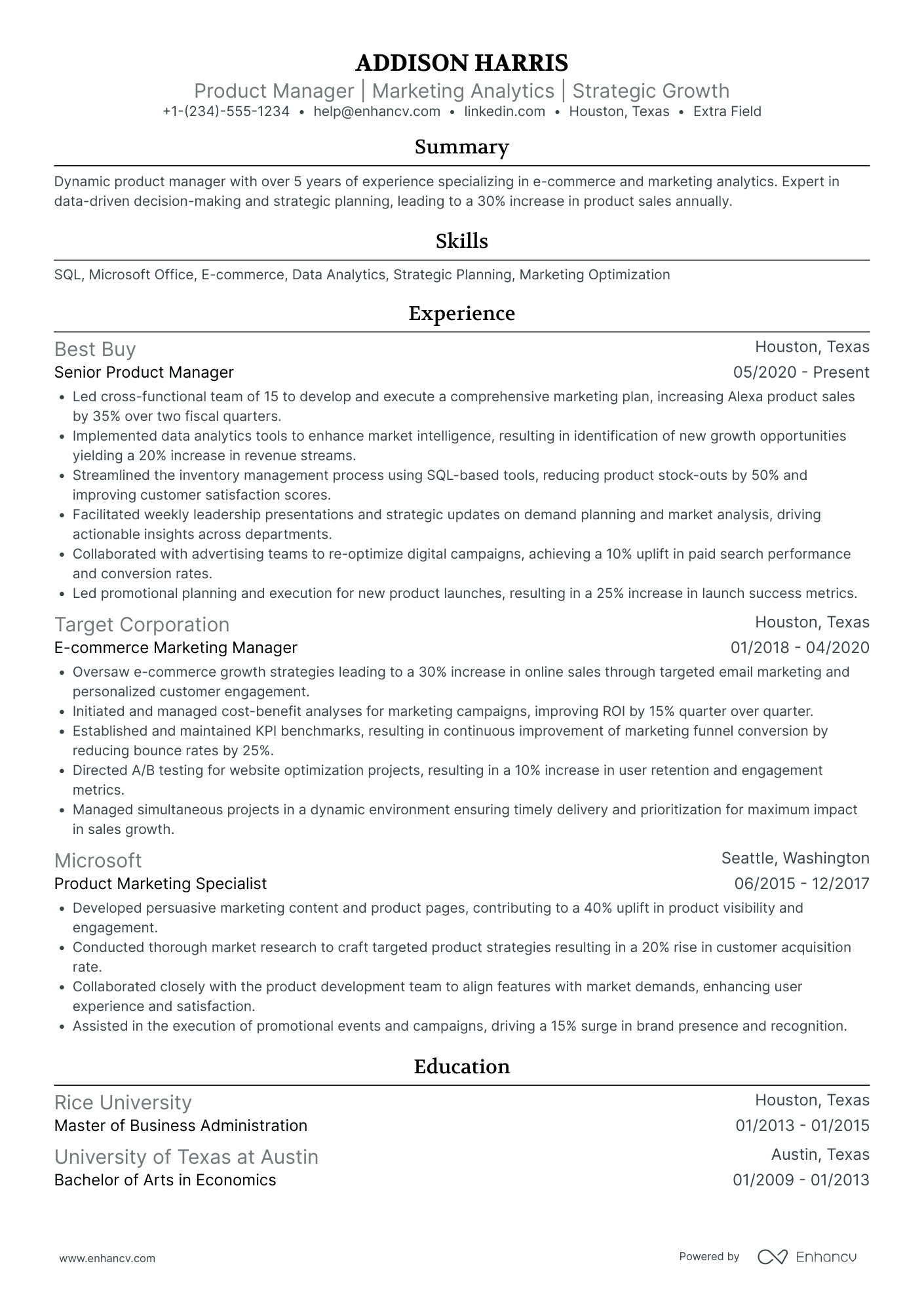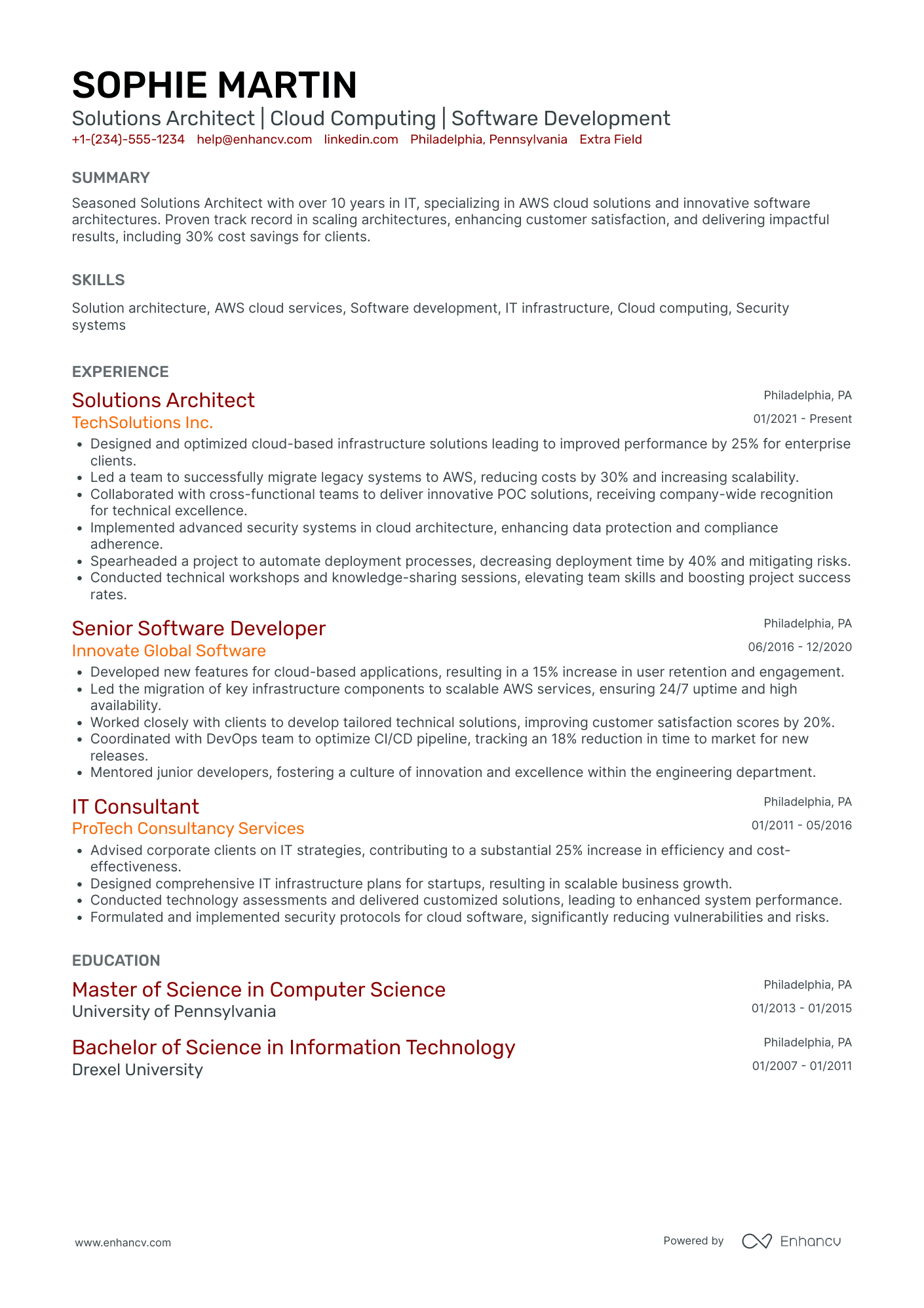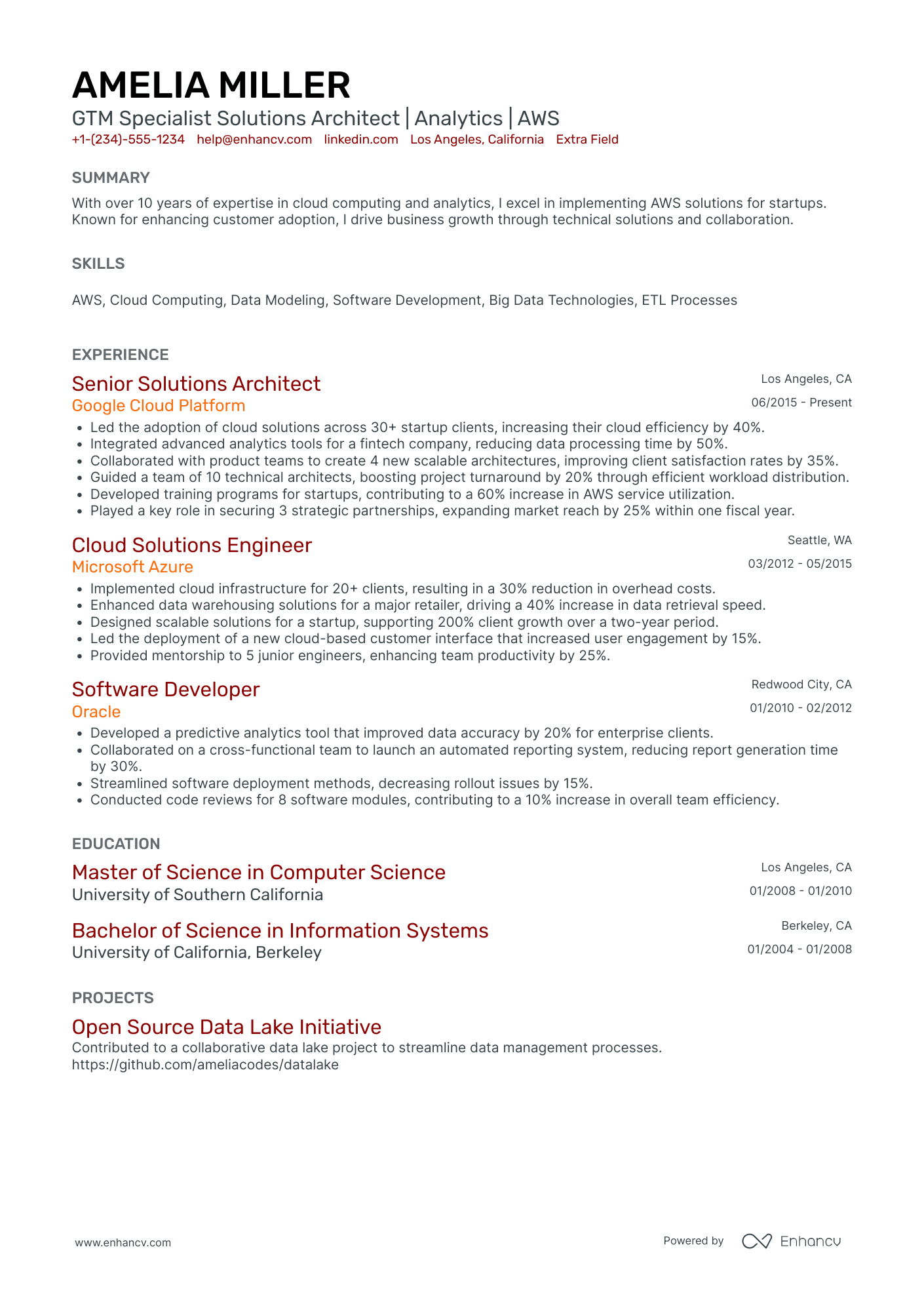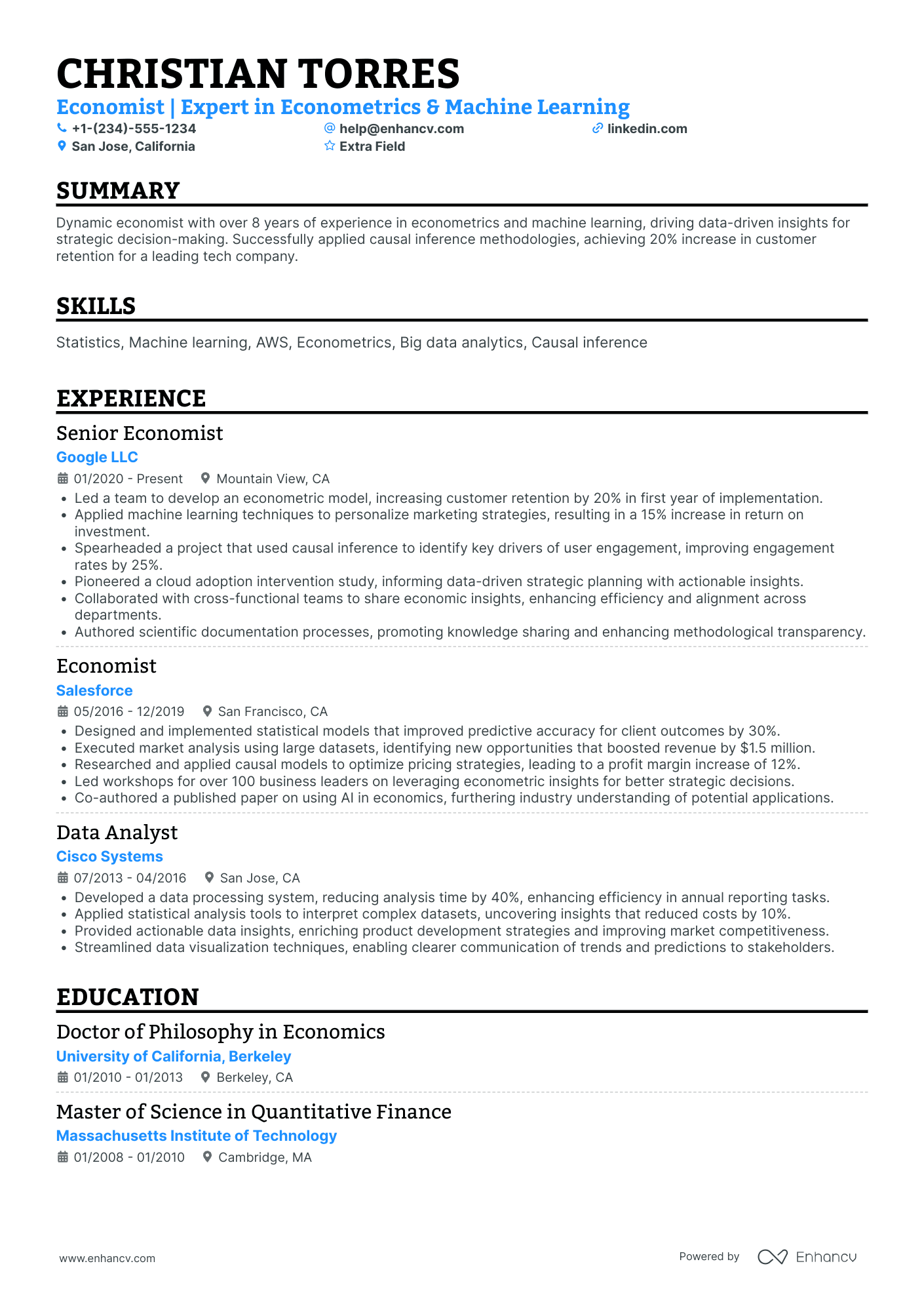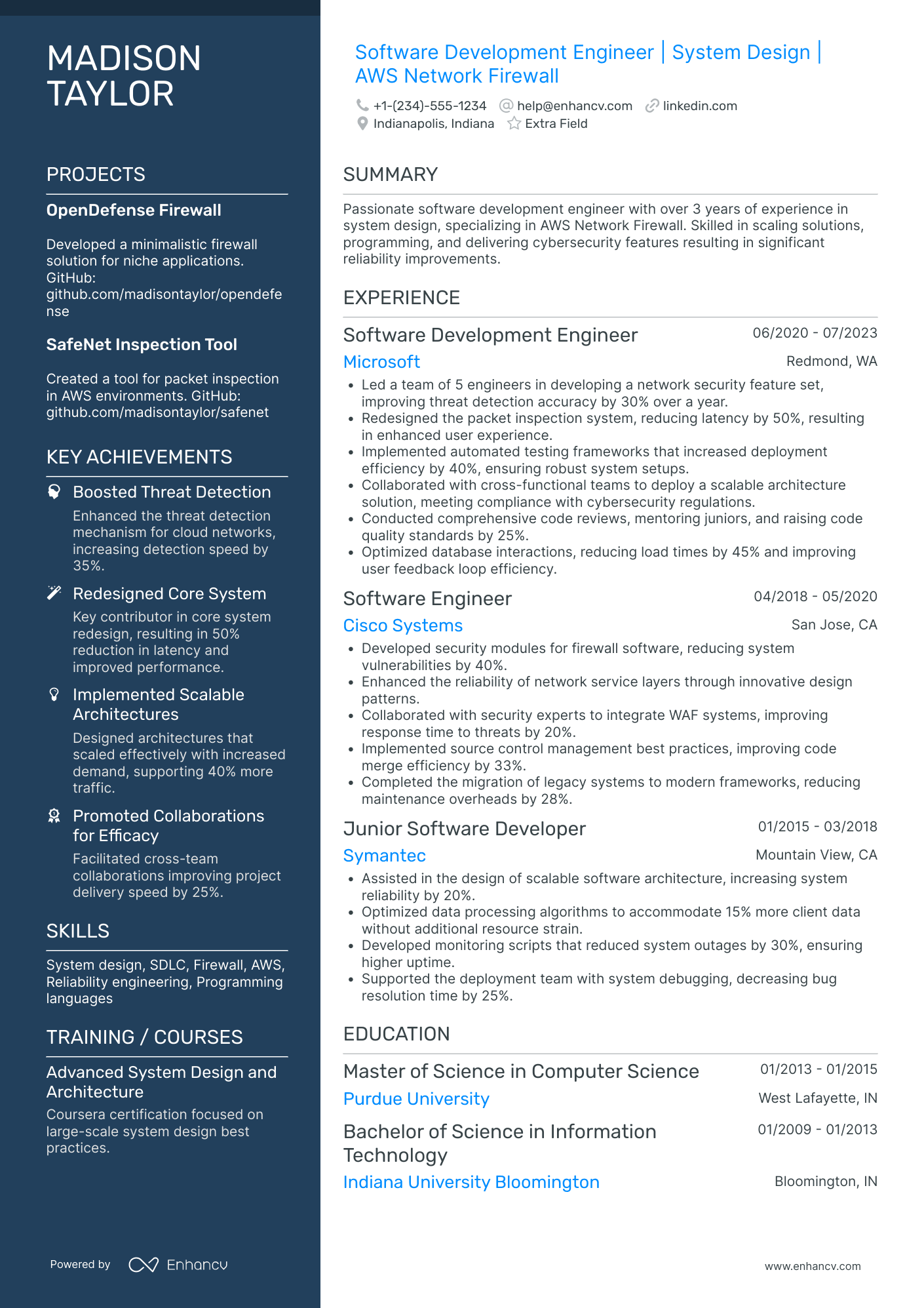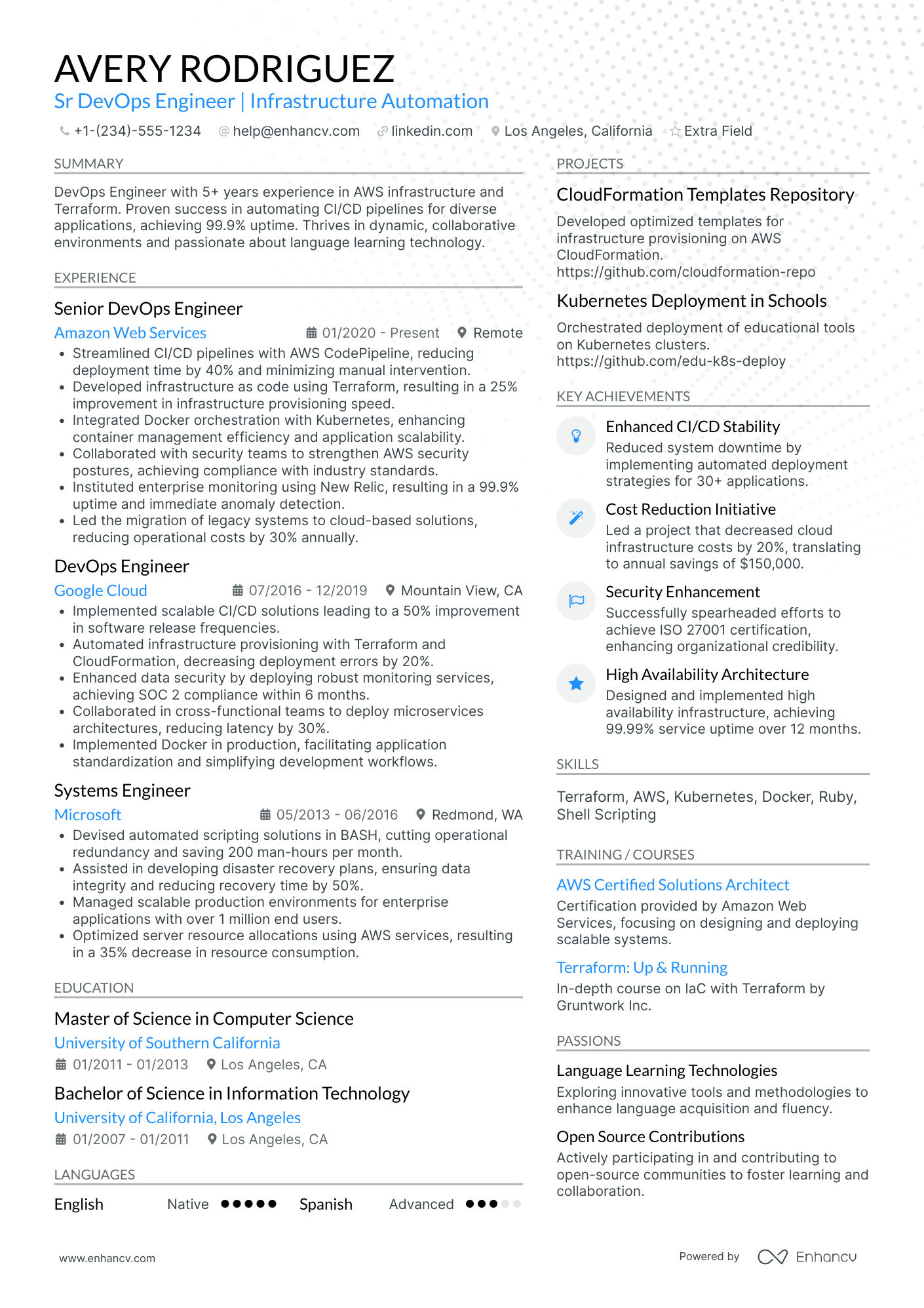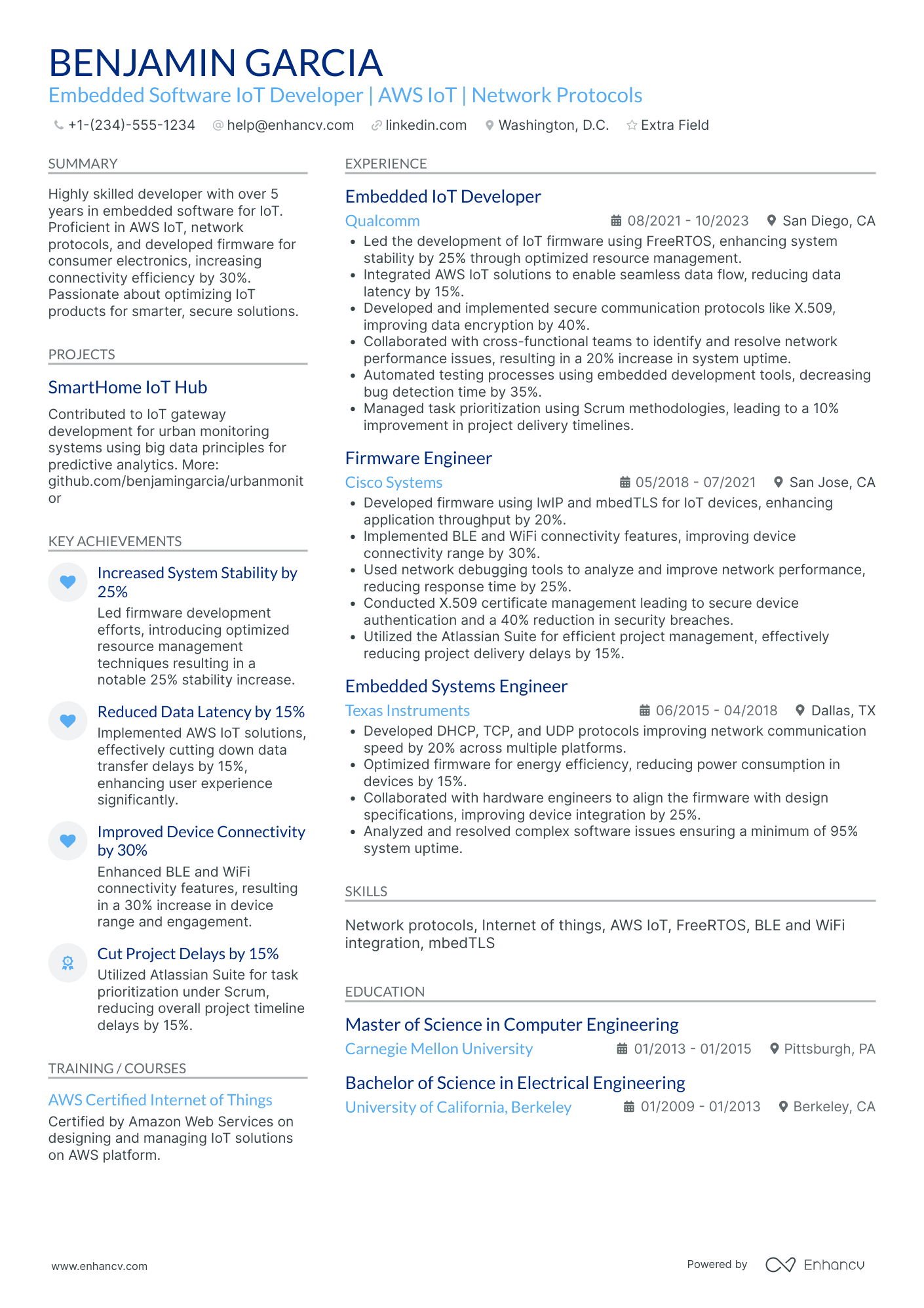Impressing recruiters with your AWS resume can be a challenge, especially when you want to balance your technical expertise and your non-technical strengths. In AWS roles, it's not just about knowing the tools. It's also about your ability to continuously adapt to the rapid updates AWS releases every year.
In this guide, you’ll find practical tips for tailoring your experience and skills to the specific AWS role you’re targeting. Whether you’re applying for an AWS Solutions Architect, an AWS DevOps Engineer, or another position, this guide will help you effectively present your knowledge, while addressing some of the most common challenges that candidates face.
Key takeaways
- The reverse-chronological resume is popular with recruiters, especially for AWS professionals.
- Use clean templates with subtle colors to highlight your cloud computing and technical skills.
- Tailor your experience to the job by focusing on measurable results.
- Underline soft skills, such as problem-solving, collaboration, and adaptability, in your summary or experience section.
- Degrees in Computer Science, Information Technology, or Engineering, along with certifications like AWS Certified Solutions Architect or SysOps Administrator, are valuable.
- Add personality with sections on achievements, cloud migration projects, or innovations in AWS infrastructure.
Let's look at a sample resume to get a grasp of what the final result should look like.
AWS resume sample
Use Alex’s resume as a template—just copy it and replace the fields with your information. You can also start from scratch and use our Enhancv resume builder—it only takes minutes.
Alex Johnson
Cloud Solutions Architect
alex.johnson@enhancv.com | LinkedIn | San Francisco, CA
Summary
Experienced Cloud Solutions Architect with 6+ years of expertise in designing, deploying, and optimizing AWS-based infrastructures. Proficient in automation, container orchestration, and cost management strategies. Adept at improving system performance and ensuring cloud security best practices. Strong background in serverless computing and infrastructure scalability, with proven success in delivering highly available and cost-efficient solutions for enterprise applications.
Experience
Cloud Solutions Architect
Amazon Web Services, San Francisco, CA
March 2020 – Present
- Lead the design and deployment of scalable cloud architectures using AWS services, including EC2, Lambda, and RDS.
- Automate infrastructure provisioning with AWS CloudFormation and Terraform, reducing manual efforts by 40%.
- Collaborate with development teams to implement container orchestration using Kubernetes, improving application performance by 25%.
- Spearhead cloud cost optimization strategies, achieving an average of 20% in operational savings for clients.
- Enforce AWS security best practices, including IAM policies, VPC configurations, and automated compliance monitoring.
Cloud Engineer
Google Cloud, San Francisco, CA
June 2017 – February 2020
- Designed and managed cloud environments for enterprise clients, focusing on AWS and GCP hybrid solutions.
- Developed serverless applications using AWS Lambda and API Gateway, improving development cycle time by 30%.
- Optimized resource utilization, cutting infrastructure costs by 15% through reserved instance planning and rightsizing.
- Implemented CI/CD pipelines using AWS CodePipeline and Jenkins, reducing deployment time by 50%.
- Provided training to internal teams on cloud architecture best practices and infrastructure as code (IaC) principles.
Education
Bachelor of Science in Computer Science
University of California, Berkeley
Graduated: 2016
Certifications
AWS Certified Solutions Architect – Professional
AWS Certified DevOps Engineer – Professional
Certified Kubernetes Administrator (CKA)
Skills
- AWS Architecture Design
- Container Orchestration (Kubernetes, Docker)
- Infrastructure as Code (Terraform, CloudFormation)
- Serverless Computing (AWS Lambda, API Gateway)
- Cloud Security Best Practices
- CI/CD Pipeline Automation
- Cost Optimization Strategies
- Monitoring & Logging (CloudWatch, Prometheus)
Languages
- English (Native)
- Spanish (Fluent)
Having reviewed a sample resume, let’s explore different formats to best present your credentials.
How to format an AWS resume
When crafting your AWS resume, readability and structure are your main goals. Show recruiters you're as attentive to detail in your document as you are in managing cloud infrastructure and operations.
Opt for a traditional or a simple resume template to maintain a professional appearance. A clean and simple design reflects efficiency and precision—qualities that are vital when overseeing AWS services and ensuring smooth cloud operations.
Key resume sections for AWS roles
Let's briefly outline the essential sections for an AWS-related resume:
- Professional Summary
- Technical Skills
- AWS Project Experience
- AWS Certifications/Education
- References/Testimonials
We'll explore these sections a little further down in the article.
Resume format
Choose a reverse-chronological format, which tells the story of your work path starting with your most recent experience. This lets you present a clear career progression in cloud infrastructure, automation, and AWS services.
Resume design
Follow these tips to nail the design of your AWS resume:
- Aim for a one-page document to present your cloud expertise efficiently. Demonstrating your ability to summarize your experience with AWS projects and tools concisely is valuable.
- If you have a robust background, such as multiple AWS certifications or involvement in large-scale cloud projects, consider a two-column layout to balance space and content.
- Stick to a one-inch margin for readability—you don't want your resume to look cramped.
- Use subtle colors like dark blue, gray, or green for a professional yet engaging look, paired with easy-to-read fonts such as Rubik, Calibri, or Lato.
- Apply dividing lines to clearly separate sections and keep your resume neat, reinforcing your methodical approach to cloud architecture.
Resume header
Place your contact information at the top in a clean header. AWS recruiters expect precision, so double-check that all details are correct and clear.
Include:
- Your name, job title, and email address.
- A link to your LinkedIn profile or GitHub account displaying AWS projects, cloud architecture designs, or scripts.
- A brief headline, such as “Certified AWS SysOps Administrator Specializing in Cloud Infrastructure” or “AWS Solutions Architect with Expertise in Automation and Cost Efficiency.”
- A photo, but only if requested by the job description, as it’s not typically necessary for AWS positions.
Think about the market’s preferences – a Canadian resume, for instance, could have a different layout.
ATS (Applicant Tracking Systems) often causes unnecessary fear. Contrary to popular belief, our tests showed that fonts, colors, columns, and resume length don't affect parsing.
Focus on matching job description language and formatting details like dates and bullet symbols as those may affect your application. However, not all companies use ATS, so avoid keyword stuffing and keep your resume clear and readable.
File formatting
Save your resume with a professional filename: FirstName_LastName_AWSJobTitle (e.g., John_Smith_AWSArchitect). Use а PDF to preserve your resume’s layout, unless a different format, such as Word, is requested in the job listing.
Lastly, proofread your resume carefully to avoid errors. Accuracy is especially important for AWS roles where attention to detail is key. Our free AI resume checker can help ensure your resume is polished and ready to submit.
Is your resume good enough?
Drop your resume here or choose a file. PDF & DOCX only. Max 2MB file size.
With your format in place, it’s time to delve into how to showcase your experience effectively.
How to write your AWS resume experience
AWS roles vary, but regardless of your specific job title, you can follow these general guidelines to create a standout experience section:
- Highlight any roles where you’ve managed cloud infrastructure, implemented solutions, or automated processes that align with the AWS role you’re targeting. Whether you've been an AWS SysOps Administrator, Solutions Architect, or DevOps Engineer, focus on experience that directly relates to the position.
- For each role, provide job titles, company names, locations, and dates of employment.
- Demonstrate initiative using power words such as “implemented,” “configured,” “automated,” “optimized,” and “designed” to show how you’ve driven cloud projects and improvements.
- Use bullet points to keep your experience clear and scannable.
- Emphasize situations where you've successfully optimized cloud environments, improved scalability, reduced costs, or enhanced security, and highlight how your AWS expertise led to operational improvements or cost savings.
Target the job posting
Regardless of the role you’re after, the optimal strategy is to tailor your resume to the job posting. Aligning your skills with the specific job proves effort and genuine interest. You can do it by selecting your most relevant achievements that match the role you're applying for and using keywords from the job description to quickly show HR you're a good fit.
Let's look at a real AWS job posting. We've highlighted the parts we’re going to target in the example entry below.
AWS Dedicated Cloud Engineer, Commerce Platform - Amazon Dedicated Cloud (ADC)
Company overview
Amazon Web Services (AWS) is the world’s most comprehensive and broadly adopted cloud platform. We pioneered cloud computing and never stopped innovating—that’s why customers from the most successful startups to Global 500 companies trust our robust suite of products and services to power their businesses.
Key job responsibilities
The ADC Commerce Platform team is seeking highly motivated engineers who are focused on operational excellence and troubleshooting complex system operations, have a solid understanding of Linux, networking, and general knowledge of cloud services. We need engineers who understand how to think big, and simplify solutions to complex problems; all the while ensuring that our customers continue to have the best experience possible.
A day in the life
On a typical day, our engineers may dive deep to find the root cause of a customer issue, investigate why a metric is trending in the wrong direction, or discuss radical new approaches to automate operational processes.
Basic qualifications
- Associate's degree, or Cloud+ or GICSP (Global Industrial Cyber Security Professional) or GSEC (GIAC Security Essentials) or SSCP (Systems Security Certified Practitioner)
- 3+ years of systems administration experience (Linux/Windows).
- Experience working with scripting languages.
- Current, active US Government Security Clearance of Top Secret or above.
Preferred qualifications
- 3+ years experience with cloud computing technologies.
- 3+ years of experience with support procedures and methodologies for production computing environments.
- Experience automating routine tasks.
- Experience troubleshooting.
- Experience with performance and log analysis.
And here's the targeted entry:
- •Managed daily operations of over 500 Linux-based systems, improving uptime by 15% through proactive monitoring and troubleshooting.
- •Automated routine system administration tasks using Python and Bash scripting, reducing manual workload by 25%.
- •Collaborated with a cross-functional team to resolve critical security vulnerabilities, improving overall system security by 20%.
- •Led a project to improve network performance by 30% through analysis and troubleshooting of network traffic and configurations.
- •Mentored a team of five junior engineers on best practices for system operations and cloud computing, resulting in a 40% improvement in response times to incidents.
- •Communicated effectively with customers to troubleshoot and resolve system issues, maintaining a 98% customer satisfaction rate.
Here's why this entry works:
- Emphasized managing daily operations and improving uptime to reflect the focus on operational excellence.
- Highlighted automating tasks using scripting languages, directly addressing the need for automation experience.
- Included mentoring junior engineers and collaborating with teams, showing the ability to work with others and communicate effectively, and reflecting soft skills relevant to the role.
Next, let's enhance your experience section by quantifying your achievements, making them measurable and impactful.
How to quantify your AWS experience on a resume
Quantifying your experience is crucial for AWS roles because it demonstrates the real impact of your work. This approach also helps you stand out from other candidates by offering tangible evidence of your ability to deliver meaningful improvements in real-world scenarios.
Here are some practical tips:
- Highlight the percentage of cost savings from optimizing AWS resource usage, as this directly illustrates the business value of your involvement.
- Specify the number of security vulnerabilities you have identified and addressed in your AWS deployments to underscore your contribution to maintaining critical data security.
- Detail the amount of data you managed or migrated in AWS, showing your aptitude in handling large volumes of data in the cloud.
- Document the decrease in incident response times as a result of automation practices you implemented, reflecting your capabilities in enhancing operational efficiency.
- Quantify the improvement in system performance, if any, due to your architectural changes on AWS, expressing your knack for enhancing system capacities.
If you’re lacking in direct experience, consider how you can emphasize applicable skills and accomplishments instead.
How do i write an AWS resume with no experience?
If you're aiming to work in AWS without direct experience, crafting your resume strategically is essential. Instead of focusing on traditional work experience, use a functional or hybrid resume format to highlight your skills, certifications, and projects. The functional resume emphasizes your skills and qualifications over work history, while the hybrid format combines both skills and experience.
Make sure to:
- Emphasize your transferable skills like cloud computing, scripting languages (Python, Bash), and networking.
- Underscore any AWS certifications, such as AWS Certified Cloud Practitioner or AWS Certified Solutions Architect – Associate.
- Include hands-on AWS projects, even if self-driven or from courses.
- Underline any cloud computing courses or boot camps, especially if they focus on AWS services.
- List the specific tools and platforms you've worked with, such as Docker, Linux, or Terraform.
To make your resume stand out, add a tailored objective statement. This section should reflect your career goals while aligning them with the company’s needs. Keep it short—up to three sentences, and focus on what you want to achieve in the future.
After addressing different levels of experience, let’s focus on the vital roles of hard and soft skills on your resume for AWS.
AWS skills on your resume
АWS roles require a mix of cloud computing, technical, and problem-solving skills. Your skills section will stand out by highlighting your ability to work with AWS services, manage cloud infrastructure, and ensure system scalability. Include AWS-specific competencies, but remember not to exaggerate your abilities, as these can be easily measured and tested.
Outline your industry-specific knowledge in a separate section.
Here's what it might cover:
Best hard skills for your AWS resume
- Amazon S3
- Amazon EC2
- AWS Elastic Beanstalk
- AWS Lambda
- AWS Glacier
- Amazon RDS
- Amazon DynamoDB
- AWS Management Console
- Amazon CloudFront
- Amazon Route 53
- Amazon VPC
- AWS CodeStar
- AWS CloudFormation
- AWS Auto Scaling
- AWS Identity and Access Management (IAM)
- Amazon Redshift
- AWS Elastic Load Balancer
- Amazon Elasticsearch Service
- Amazon Aurora
- AWS Step Functions
As for soft skills, these are best illustrated through specific examples in your summary or experience sections. Listing people's skills one after the other won't tell recruiters much, but providing context will.
Here are some you can add to your resume:
Best soft skills for your AWS resume
- Problem-solving
- Communication
- Teamwork
- Adaptability
- Self-learning
- Time management
- Decision-making
- Creativity
- Patience
- Critical thinking
- Project management
- Negotiation
- Leadership
- Analytical thinking
- Attention to detail
- Conflict resolution
- Strategic thinking
- Ability to work under pressure
- Emotional intelligence
With your skills outlined, we move to the essential details of your education and certifications.
How to list your certifications and education on your AWS resume
To craft a strong education section on an AWS resume, it's essential to highlight both your formal education and relevant certifications that validate your technical skills. This section serves as proof of your foundational knowledge, specialized training, and commitment to the field, setting you apart from other candidates.
Your education entry should include:
- The degree and major earned (e.g., Bachelor of Science in Computer Science).
- The name of the university or institution where you earned your degree.
- The year of graduation.
- Coursework that directly applies to AWS, listing a few key subjects (mostly for entry-level candidates).
Here's what a good education section looks like:
- •Completed coursework in network security, Linux systems, and cloud infrastructure.
This entry highlights relevant coursework that matches the key job responsibilities and preferred qualifications, such as Linux systems and cloud infrastructure.
How to add AWS certifications on a resume?
Additional training validates your proficiency in AWS tools and services. Ensure that the certifications you list match the job description.
Best certifications for your AWS resume
Following your academic credentials, it’s crucial to distill all this information into a compelling resume summary.
How to write your AWS resume summary
A resume summary is a concise statement (up to five sentences) at the top of your AWS resume that highlights your most relevant skills, experience, and achievements. It should quickly show how your cloud computing expertise, troubleshooting skills, and operational excellence align with the job requirements.
Here's an example:
This summary is effective because it aligns the candidate's qualifications with the specific needs of the job, mentioning key skills such as automation, troubleshooting, and cloud computing technologies. The mention of an active Top Secret Clearance further emphasizes their value for sensitive roles, enhancing their appeal to AWS.
Finally, complement your resume by integrating additional sections that underline your unique qualifications and interests.
Optimize your resume summary and objective for ATS
Drop your resume here or choose a file.
PDF & DOCX only. Max 2MB file size.
Additional sections for an AWS resume
Optional sections can significantly strengthen your AWS resume by showcasing relevant projects or extracurricular activities that demonstrate hands-on experience with cloud technologies and commitment to continuous learning.
Our top suggestions include:
- Specific cloud projects, such as designing scalable infrastructure or automating deployments using AWS services. This showcases practical skills.
- Any cloud-related articles, blog posts, or white papers you've written to demonstrate your thought leadership and expertise in the AWS ecosystem.
- Relevant industry events you've attended or presented at, such as AWS re
or cloud-focused webinars, to show your active participation in the cloud community. - Volunteer roles where you implemented or assisted with AWS solutions, showing your initiative and dedication to cloud technology in various environments.
In conclusion
Our AWS resume guide provides key examples and actionable tips on formatting, highlighting relevant experience, including technical and non-technical skills in your application, and presenting your education effectively.
By strategically tailoring your resume to the specific AWS role you're targeting, you'll boost your chances of impressing recruiters and landing your ideal job in the cloud computing industry.
AWS resume examples
By Experience
By Role
